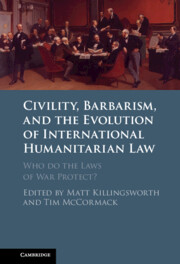 Civility, Barbarism and the Evolution of International Humanitarian Law
Civility, Barbarism and the Evolution of International Humanitarian Law Humanitarian Decision-Making about Military Asset Use*
Published online by Cambridge University Press: 11 January 2024
The principle of distinction in International Humanitarian Law sets up two entities, the civilian and the combatant, and organises the relationship between them. This socio-legal chapter draws on original research from South Sudan to explore how this principle is operationalised in humanitarian–peacekeeper interactions. Humanitarian actors routinely invoke ‘distinction’ as they navigate operational dilemmas with respect to the use of military assets, and in their relationship with the UN Mission in South Sudan more generally. Two ‘ideal types’ of humanitarian actor emerge here. The first type takes a strict approach to distinction, thinking long term and eschewing military asset use that undermines distinction. The second type interprets distinction flexibly and balances it with other goals such as reaching people in need; this exposes a hidden conflict between the principles of distinction and humanity. Through these everyday interactions – which sometimes involve drawing lines within the civilian category – humanitarian actors produce distinction in law, in practice, and in perception.
To save this book to your Kindle, first ensure [email protected] is added to your Approved Personal Document E-mail List under your Personal Document Settings on the Manage Your Content and Devices page of your Amazon account. Then enter the ‘name’ part of your Kindle email address below. Find out more about saving to your Kindle.
Note you can select to save to either the @free.kindle.com or @kindle.com variations. ‘@free.kindle.com’ emails are free but can only be saved to your device when it is connected to wi-fi. ‘@kindle.com’ emails can be delivered even when you are not connected to wi-fi, but note that service fees apply.
Find out more about the Kindle Personal Document Service.
To save content items to your account, please confirm that you agree to abide by our usage policies. If this is the first time you use this feature, you will be asked to authorise Cambridge Core to connect with your account. Find out more about saving content to Dropbox.
To save content items to your account, please confirm that you agree to abide by our usage policies. If this is the first time you use this feature, you will be asked to authorise Cambridge Core to connect with your account. Find out more about saving content to Google Drive.